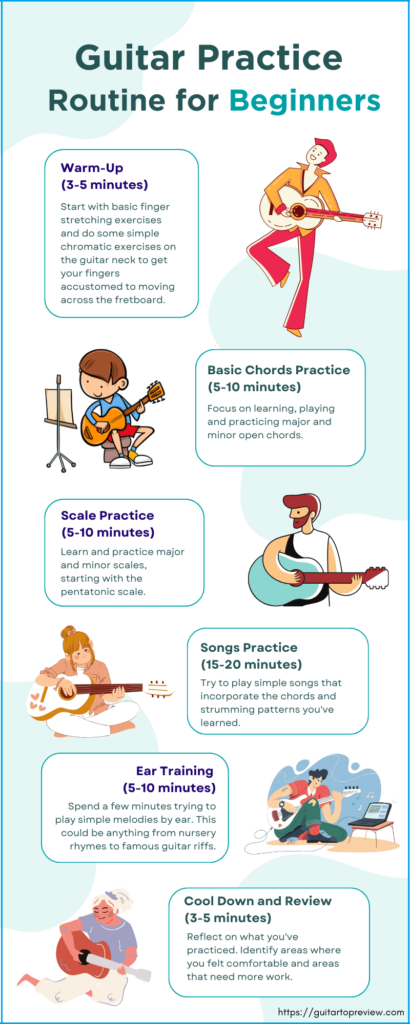As a guitar teacher with over 16 years of experience, I’m often asked “How much should I practice to become a great guitar player?”. It’s a fair question that deserves more than a simple number as the answer.
If you want to play guitar or any instrument at all it is necessary to put as much practice as possible in. Of course, it isn’t just about how much you practice but also about consistency and quality. It is important to work on the right skills and techniques so that you can follow the progress you make.
In this article, I’ll share some thoughts and tips on how much you should practice guitar based on my decade-plus experience as a performing guitarist and teacher. You’ll learn how to make every minute with your guitar productive, how to structure an effective routine, when to take breaks, and how to avoid common pitfalls like practicing too much.
Follow these tips, and you’ll be well on your way to sounding like a pro and grabbing that guitar more eagerly each day. Read on to transform your guitar practicing and accelerate your guitar skills starting today.
Benefits of Regular Practice
Establishing regular practice sessions is crucial if you aim to master the guitar. Even professional musicians never stop practicing guitar. While mindless practice gets you nowhere, effective guitar practice requires focus and intention behind every session.
Scheduling unbroken practice sessions builds muscle memory faster since your mind and body get into a flow state. The more regularly you can commit to focused guitar practice sessions, the quicker you’ll see improvement. Growth happens between practices as the brain consolidates new information overnight.
Playing guitar also becomes more intuitive over time the more your hands learn those chord changes and scale patterns. You’ll notice jam sessions and live playing feel easier as that once-tough solo suddenly flows from your fingers. Staying motivated through regular practice sessions will get you closer to playing guitar like your heroes sooner than you think.
Aim for at least 30-45 minutes of intentional, focused practice daily if you want to play guitar well. Just be careful not to overdo it early on to prevent burnout or injury. Trust in the process and keep up your regular practice sessions to become the guitarist you dream of being.
How Often Should I Practice?

Whether you are taking beginner guitar lessons, or are an advanced player you will want to put in a lot of practice. However, if you are a complete beginner you will want to ease into a heavy schedule. That way you will be able to keep an eye on your technique and avoid any injuries or problems.
- Start with 15-30 minutes once a day, by the end of practice your fingers should be a little sore but not too much.
- If you are fine with practicing this amount every day for a week, go for it. If you need to take a day break to rest, do that, otherwise, it’s ok to push through some pain. This will help build your calluses!
Once you get past a month or two of the beginning stages you can start increasing your practice time and adding more complex routines.
- The length should now be about 45 minutes, with different aspects on technique, guitar chords, and music theory.
- Do not do the same lesson every day. Switch it up every other day with another approach. This will help keep you interested, and keep you having fun! It can be very easy to stick to scales, then you get bored and frustrated.
- As you get more advanced it’s OK to take a couple of days off, but never go too long. Each day that you don’t practice you will lose some ability, so keep at it!
How Much Is Too Much
While professional musicians practice for hours each day to perfect their guitar technique, as a beginner it’s important not to overdo it. Even 15 focused minutes of practice can be beneficial if done regularly.
A good rule of thumb is to practice a minimum of 15 minutes but not over 60 minutes daily. Aim to practice guitar for at least 15 minutes per session, setting short breaks to avoid fatigue.
Quality matters more than quantity, especially at first. Sticking to a minimum daily practice routine is better than attempting multiple lengthy, unfocused sessions that can lead to burnout, frustration, and diminished returns.
Moderation is key – listen to your body and take rest days to recover. Pushing yourself too hard by practicing too much can actually be detrimental, causing bad practice habits, loss of motivation, and even injury over time. Remember, slow and steady consistency wins the race.
What Should I Practice?
As we mentioned effective practice is not just about quantity, it is about quality and consistency. 15 minutes of slow and structured guitar work will be a lot better for you in the long run than hours of meandering and noodling.
One of the best places to get started is with online lessons and instruction like these. With the convenience of virtual guitar programs, you can practice anywhere at any time!
Guitar Practice Routine
Here’s a simple outline for a beginner guitar practice routine that will be easy and fun to keep coming back to every day:
Warm-Up (3-5 minutes)
- Start with basic finger stretching exercises to loosen up your fingers.
- Do some simple chromatic exercises on the guitar neck to get your fingers accustomed to moving across the fretboard.
Basic Chords Practice (5-10 minutes)
- Focus on learning, playing and practicing major and minor open chords (e.g., C, G, D, A, E, Am, Em, Dm).
- Strive to get clear sounds from each string and work on smooth transitions between chords.
- Practice various strumming patterns using a pick or your fingers.
- Begin with simple down and up strums, then gradually try more complex patterns.
Scale Practice (5-10 minutes)
- Learn and practice major and minor scales, starting with the pentatonic scale.
- This helps with finger dexterity and understanding the guitar’s fretboard.
Songs Practice (15-20 minutes)
- Try to play simple songs that incorporate the chords and strumming patterns you’ve learned.
- This is not only fun but also helps in applying what you’ve learned in a musical context.
Ear Training (5-10 minutes)
- Spend a few minutes trying to play simple melodies by ear. This could be anything from nursery rhymes to famous guitar riffs.
- This practice develops your ear and helps you become more intuitive with the guitar.
Cool Down and Review (3-5 minutes)
- Reflect on what you’ve practiced. Identify areas where you felt comfortable and areas that need more work.
- Do some light finger stretching to relax your muscles.
Unbroken Practice Sessions (Infographic)

Guitar Practice Tips
Tips #1: Use a metronome! These are often associated with shredding but they should be used all the time for better timing and strumming. Play single notes and chords at a slow time and only increase the speed when it sounds great. There are many ways to play and experiment with the metronome, pretend every beat is on the 2 and 4 and that will help with swing.
Tips #2: Play chords and chord progressions and learn them with open and barre chords across the fretboard. Don’t just study the positions of the chords but also keep in mind what the notes and formulas of the chord are. Chord progressions are the backbone of songs, so knowing the basic structure will eventually make it so you can play anything.
Tips #3: Play along with drums or backing tracks as you work on scales, chords, and progressions. Use various genres and time signatures to get different vibes and grooves, of course, keeping the tempo down until you can play it correctly.
Tips #4: Learn to play new and old songs! If you are a new guitarist stick to what you know and try to learn by ear, only use tabs when you are stuck. As you advance it is important to find new songs as that will enhance your listening skills.
Tips #5: Study other instruments and music! If you are around someone with a different instrument, ask them how to play it. When you hear a new style or artist, investigate them, especially if you may not like them. The brain is a sponge just soaking up knowledge, to fully understand the guitar it helps to look at the big picture.
Tips #6: Keep a journal of your progress. Whether it is simple or detailed notes, keep a record of how practice is going, this will help with what to focus on and later you can look back to fix any issues. Over time you will see what works best and you then build on that.
Final Words
It is important to practice guitar as much as you can, especially in structured lessons that will lead to improvement. Each musician will be different in what works best for them but they all share the same need for consistent and proper repetition.
If you work hard and keep your eyes on simple attainable goals, it won’t take long before you can impress yourself and others with your guitar skills!
About the Author
Throughout Gary's career, from School of Rock, to Public School Modern Band Teacher, to Director of Curriculum at Little Kids Rock, there has been one single mission - to empower students to discover, play, and create music on their own terms. His role is simply to be the best guide he can be.


